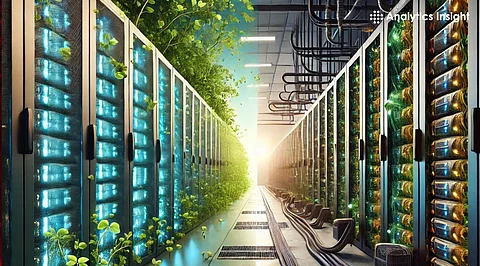

AI data centers are moving to urban areas to support real-time AI inference, boosting speed and reducing latency.
High power demands and heat generation are driving upgrades in power grids and cooling systems.
India is emerging as a global AI hub with major investments and an AI-focused SEZ in Nava Raipur.
A silent revolution is reshaping the digital world. AI data centers are no longer confined to remote locations; they are moving closer to urban areas, bringing computing power to the edge. This shift is not just about technology; it's about transforming the very infrastructure that connects data to people.
The surge in AI applications demands real-time processing, leading to a boom in last-mile infrastructure. Edge computing, enhanced power grids, and advanced cooling systems are becoming essential to meet the growing needs of AI inference. This evolution is redefining how data centers operate and where they are located.
Traditionally, AI model training occurred in massive, centralized data centers situated in remote areas with abundant power. However, the focus is now shifting to AI inference, which requires immediate data processing near end-users.
This change is driving the development of smaller, decentralized data centers in urban locations, enhancing speed and reducing latency.
The new generation of AI chips and server racks demands unprecedented power densities, with some racks reaching up to 130 kW. This requirement surpasses traditional data center norms, necessitating significant upgrades to local power grids and transmission systems. Innovations like Small Modular Reactors (SMRs) are being explored to provide scalable, green-energy solutions for these high-demand centers.
With greater power, a more intense heat is produced. The very advanced cooling must be considered so that proper working conditions can be maintained. The operator or owner opts for liquid cooling systems since very dense servers generate great heat that must be taken care of in terms of reliability and performance.
Building new long-distance transmission lines is time-consuming and costly. As a result, data center site selection now prioritizes proximity to existing power infrastructure and urban populations. This strategy accelerates the development of last-mile connectivity, bringing data processing closer to the point of use.
The huge energy consumption of AI data centers has made everyone think about sustainability. Operators have resorted to renewable sources of energy and real-time AI-based energy optimization, grid stabilization, and load balancing. Such initiatives are to shore up against the impending environmental threats with the expansion of data centers.
Investment in data center infrastructure is pouring in, driven by the provision of AI-driven services. About $60 billion has been invested in data centers in India, and the number is supposed to cross the $100 billion mark by the year 2027.
Mumbai has gained fame as a global hub for data centers, ranking sixth worldwide in terms of under-construction capacity.
Challenging the limitations of the present atmosphere, India is coming forth to develop its first AI-focused special economic zone (SEZ) in Nava Raipur of Chhattisgarh. With Rs 1000 crore investment, this island will have a state-of-the-art data center developed for futuristic AI technologies. This is set to enable India to dominate the AI-services realm in the world and attract huge tech corporations to inculcate growth that benefits all.
AI data centers are revolutionizing last-mile infrastructure! From edge computing to sustainable power solutions, discover how the digital landscape is evolving. The evolution of AI data centers is not merely a technical advancement; it marks a change in the digital-infrastructure landscape.
Placing the center closer to the end-users, enhancing its power and cooling, and greening its operations are the new limits in the last-mile infrastructure boom brought about by these centers. This change is necessary to cater to the ever-growing needs of AI applications and to ensure that data processing is done efficiently, reliably, and easily.
Also Read – Black Forest’s Kontext AI: Create and Edit Images Like a Pro
